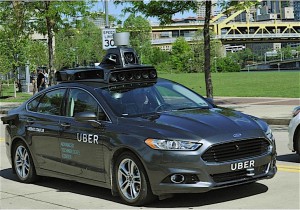Amazon is looking at more than just drones to help deliver tomorrow’s books, shoes and electronics: it’s got a team of a dozen people investigating autonomous vehicles.
Before the folks at General Motors, Ford, Waymo or Uber get nervous, according to a report in the Wall Street Journal, the company is really looking into how it can best exploit the technology for its delivery services.
The team is really an investigative unit to see how it can best take advantage of the technology rather than a group of engineers looking to build a working model. Amazon did not immediately respond to a request for comment, according to story.
Amazon’s interest shouldn’t be all that surprising as CEO Jeff Bezos, who also runs rocket company Blue Origin, has always sought ways to build a better mousetrap when it comes to the company. It led the company to its current drone delivery testing program.
(Waymo levels new charges against Uber. Click Here for the story.)
Moving into self-driving vehicles would be a logical extension of that, especially for long-haul trucking. There are plenty of options for Amazon to examine, such as Otto, which sent a truck across the U.S. last year without a driver. Several other companies are in the testing phase of trucks, largely being conducted in Nevada.
Having an autonomous vehicle involved in deliver provides a wealth of benefits, in particular, when it comes to the aforementioned trucks, which currently have strict rules when it comes to the amount of time a driver can be behind the wheel.
“You can run an autonomous vehicle 24 hours a day, whereas regular drivers are limited to ten per day,” John Haber, CEO of Spend Management, a supply chain and logistics consulting company in Atlanta, told USA Today.
(Uber refutes Google’s stolen intellectual property charges. Click Here for the story.)
He noted that Amazon is following a predictable pattern: it often partners with other companies using innovative technology rather than building it on its own.
“That’s Amazon’s style. They see what works, then take out the middle man,” he said.
Haber pointed to Amazon’s same-day delivery service. It used couriers initially, but once it figured out how the operation worked, they began reducing its use of couriers. He expects exactly the same thing will happen with autonomous vehicles.
They watch and learn “and if it looks good long term, they’ll go back in and do it on their own.”
(Budweiser cans the driver; turns to autonomous truck to haul load of beer. Click Here for details.)
However, Amazon will need to be careful in just how much detailed information it liberates from other companies. Appropriating info or people can lead to quick lawsuits. Waymo, Google’s autonomous vehicle subsidiary, is currently locked up in a tense legal battle with Uber over self-driving technologies.

